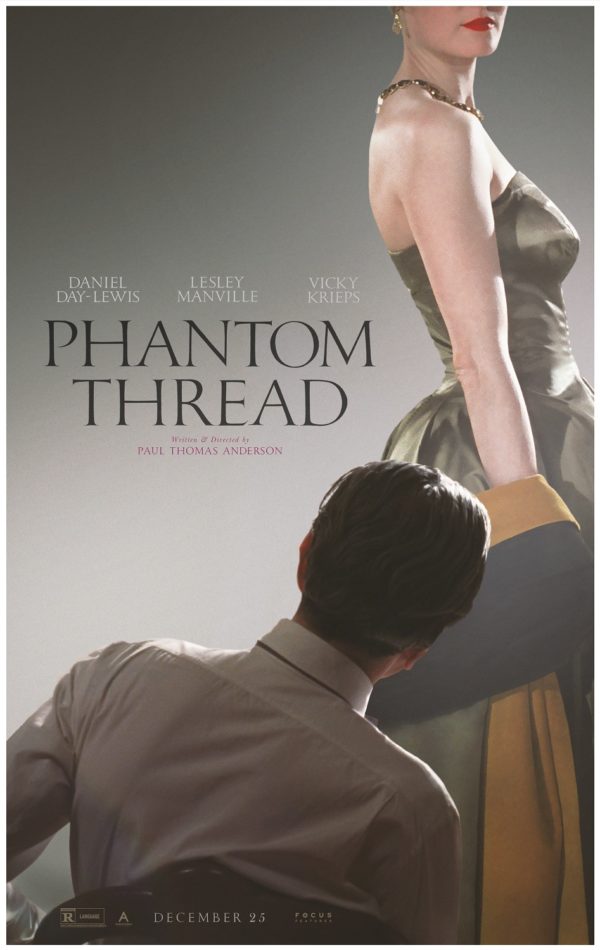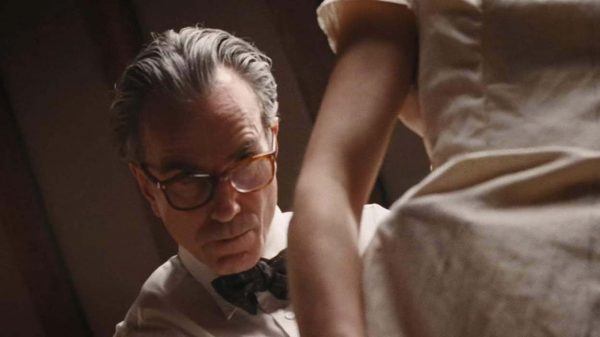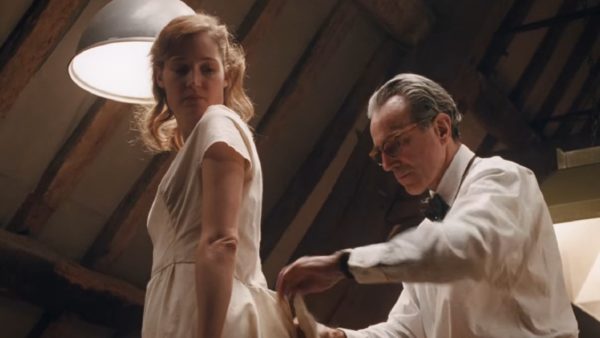Phantom Thread, 2017.
Written and Directed by Paul Thomas Anderson.
Starring Daniel Day-Lewis, Vicky Krieps, Lesley Manville, Camilla Rutherford, and Brian Gleeson.
SYNOPSIS:
Set in 1950’s London, Reynolds Woodcock is a renowned dressmaker whose fastidious life is disrupted by a young, strong-willed woman, Alma, who becomes his muse and lover.
Three-time Oscar winner Daniel Day-Lewis has delivered unforgettable method acting performances ranging from heartless oil drillers, paralyzed painter Christy Brown who only had control over his left foot, the greatest US President of all-time Abraham Lincoln, and more, so it initially came across as a little anticlimactic when he announced that his role as renowned fictional dressmaker Reynolds Woodcock in Phantom Thread would mark the end of his acting career. It doesn’t exactly feel like an explosive role to go out on, but never doubt writer and director Paul Thomas Anderson (There Will Be Blood, The Master), especially when collaborating with the notorious milkshake drinker.
There are very good reasons as to why Daniel Day-Lewis only appears in a film once every few years; he takes method acting to the extreme and commits to performances with an unhinged obsession for perfection. He actually chose to live as a paralyzed man throughout shooting My Left Foot, right down to being hand-fed meals. If that’s not the epitome of dedication to a showing, then I don’t know what is. So it’s only fitting that his final role isn’t just a dressmaker, but a person so in love with the art he creates that it complicates and sucks away from the life around him. Early on, Reynolds mentions that he likes to leave hidden notes and messages stitched into the dresses he creates a way of forever imbuing that individual garment with a piece of himself; Daniel Day-Lewis does the same in every single one of his performances. The entire character is essentially a metaphor for one hell of an impressive decades-spanning career.
To clarify, I am in no way assuming that Daniel Day-Lewis has relationship problems or trouble getting along with everyone as depicted here, but that the profound sadness that came over him while shooting Phantom Thread possibly came from resemblances to Reynolds hitting a little too close to home. It takes a lot of years away from one’s life when said individual is putting in the level of acting artistry Daniel Day-Lewis does, and maybe it’s that connection of the dots with Reynolds that gave him the push he needed to announce this role as his last, something he has been trying to do for years before an intriguing character pulls him back into filmmaking.
Theoretical analysis aside, Phantom Thread is a challenging, abstract experience bringing up questions on where the line should be drawn between dedication to work and neglect to a lover/muse. There’s a tender sequence right after Reynolds meets Alma (Vicky Krieps) where he takes her away from the diner she works at and into the House of Woodcock to try on some dresses and check her measurements. And it’s here we essentially see the magic in action, as all of Alma’s self-conscious physical appearance flaws disappear under Reynolds’ skill. Naturally, it’s not long before his commitment to designing fashionable clothing for all sorts of famous people drives a wedge in between any chance at a healthy relationship.
However, the direction Phantom Thread goes in from this framing device is what elevates it into something truly bizarre and hypnotically twisted. Unexpectedly, there is also quite a bit of laughter, most notably from a dinner argument that sees Reynolds quipping a number of sarcastic insults. Obviously, it’s also easy to feel bad for Alma in the situation, stuck knowing that her love will never be reciprocated, but she is no saint either. I’m sure viewers will take away different things, but it’s clear that Phantom Thread is acting as a social commentary on the nature of relationships and how sometimes, for as much as we may love our partners, we also like them to behave a particular way. Granted, the scenario here is an exaggerated case, but the parallels are there. Regardless, the ending is a stroke of brilliant madness.
The atmosphere of Phantom Thread also enhances the mood, feeling like a movie filmed post-WW2 and not just set there. It features an ethereal, calming orchestral score with music by Paul Thomas Anderson’s regular partner Jonny Greenwood, meticulously placed over every scene as if it were a dress itself being stitched together. Anderson also continues to grow as a filmmaker, implementing great attention to detail and close-up shots of Reynolds conducting his work, along with utilizing more complex tracking shots. Also, it goes without saying that the film is a lock for numerous awards relating to costume design. All of this comes together making for an unnerving romance with much to say about art and love.
Phantom Thread isn’t Paul Thomas Anderson’s greatest accomplishment, but that’s a difficult feat to reach considering everything he puts out is masterful in its own way, and more importantly, wildly different and refreshing from his last project. Still, the highest praise one can give the film is that it is a fitting sendoff for one of the greatest actors to ever grace a cinema screen.
Flickering Myth Rating – Film: ★ ★ ★ ★ / Movie: ★ ★ ★ ★
Robert Kojder is a member of the Chicago Film Critics Association and the Flickering Myth Reviews Editor. Check here for new reviews, friend me on Facebook, follow my Twitter or Letterboxd, check out my personal non-Flickering Myth affiliated Patreon, or email me at MetalGearSolid719@gmail.com














